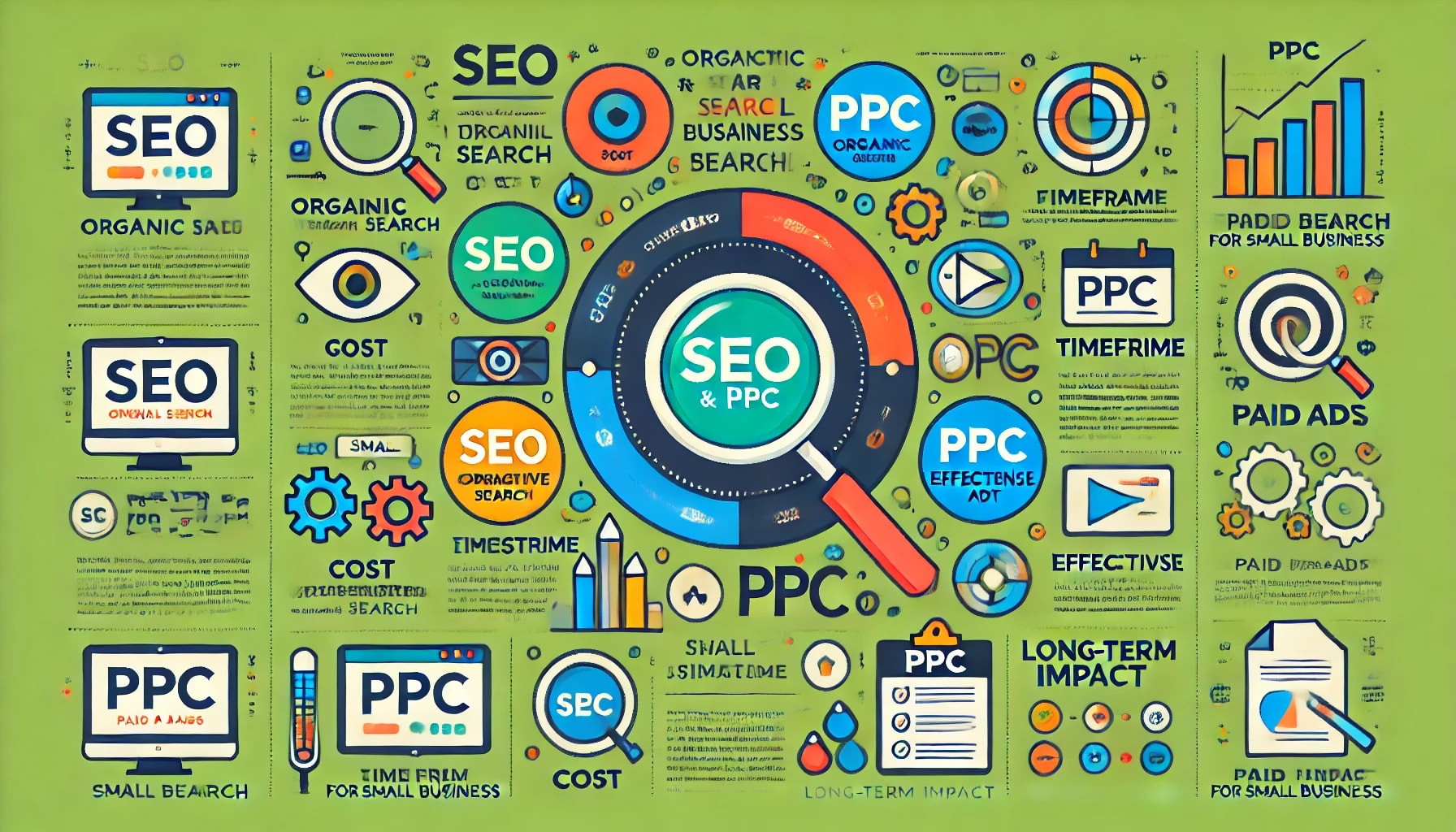Online marketing can make or break a small business in today's digital age. Think about it – when was the last time you searched online before buying something or visiting a store? If your business isn't showing up when people search for what you offer, you're missing out on potential customers.
Two key ways to improve that visibility are SEO and PPC.
In this guide, we'll break down SEO vs. PPC so you can decide which approach is right for your business.
What is SEO (Search Engine Optimization)?
SEO is the practice of improving your website to rank higher in organic (unpaid) search results.
In simple terms, it means making your site show up near the top when someone searches for your type of product or service. Instead of paying for ads, you invest time and effort to make your site more relevant to search queries.
A local bakery might tweak its website so it appears in searches for "best bakery in Holborn" or "cupcakes near Oxford Street"
Benefits of SEO
- Cost-effective: No pay-per-click fees. Once you rank well, you attract visitors with little ongoing cost, and those results can last a long time.
- Credible: People trust organic results. About 94% of users skip paid ads and click organic results instead (50 Google Ads Statistics for 2025), so appearing naturally builds trust in your brand.
Drawbacks of SEO
- Slow results: SEO is not instant. It often takes months to see substantial improvement in traffic.
- Ongoing effort & uncertainty: SEO requires continuous work (new content, site updates, etc.), and even then there's no guarantee you'll reach the top, especially in a competitive market.
What is PPC (Pay-Per-Click Advertising)?
PPC is an online advertising model where you pay each time someone clicks your ad.
With Google Ads your website can appear at the top of search results (marked "Ad") for certain keywords that you bid on.
The big advantage is immediacy: you can launch a PPC campaign and start getting visitors within hours, rather than waiting for organic rankings to build.
Pros of PPC
- Immediate visibility: Ads can show up on page one of search results as soon as your campaign starts. Great for new websites or time-sensitive promotions when you need traffic now.
- Targeted & measurable: You control who sees your ads by choosing keywords, location, time, and more, and you get detailed data on performance. Your budget goes toward reaching the right people, and you can track every click and conversion.
Cons of PPC
- Costs can add up: You pay for each click, so expenses can grow quickly, especially for competitive keywords. Without careful management, you might pay for many clicks that don't turn into customers.
- Short-lived: Traffic stops when the campaign stops. PPC is a quick boost, but it won't keep generating leads once you pause your ads.
SEO vs. PPC: Key Differences
Think of SEO as a marathon and PPC as a sprint – one builds gradual, lasting results, while the other gives a quick boost. Here's a side-by-side comparison for small businesses:
Cost
- SEO: No per-click cost. Investment is time/effort.
- PPC: Pay per click. Requires an ad budget; costs depend on competition.
Timeframe
- SEO: Slow – Takes months to improve rankings.
- PPC: Fast – Instant traffic once ads are live.
Effectiveness
- SEO: Builds long-term traffic and credibility. Many users click organic over paid results.
- PPC: Brings quick visibility and targeted traffic. Lets you appear for hard-to-rank keywords.
Long-term Impact
- SEO: Lasting impact – Traffic can continue once you rank, even if you stop actively working on it.
- PPC: Short-term – Traffic disappears when your ads are off.
Choosing the Right Option for Your Business
Should you go with SEO or PPC? It depends on your goals, budget, and competition:
- Goals & timeline: If you need fast results (like a new product launch or a limited-time offer), PPC is your best bet for instant exposure. If you're focused on long-term growth and can be patient, SEO will yield better results over time. Many businesses use both: PPC for quick wins and SEO for sustainable growth.
- Budget: If money is tight, SEO is appealing because each click is free – you invest time instead of cash. If you have funds and need results now, PPC can deliver quick wins, but monitor your spending to ensure those clicks lead to enough business.
- Competition: Check what your competitors are doing. If they're dominating paid ads, you may need PPC to stay visible. If they're not doing much SEO, that could be your chance to shine organically. In very tough markets, PPC can give you a foothold while you work on SEO.
Conclusion
Both SEO and PPC are valuable marketing tactics for small businesses. The best approach is the one that matches your needs and resources – often that means using a blend of both.
Key takeaways:
- Assess your goals and budget: Decide if you need quick wins (PPC), long-term growth (SEO), or a mix, and figure out what you can invest in time and money.
- Study your competition: See how competitors attract customers – are they using ads, SEO, or both? Use that insight to inform your approach.
- Start small and measure: Try a short PPC campaign or make some SEO improvements, and watch the results. Then focus on what works best for your business.
Remember, investing in your online presence – via SEO or PPC – is crucial to connect with customers and grow your business.
Ready to Rank Higher?
Let's discuss how our proven SEO and digital marketing strategies can help you achieve your business goals.
